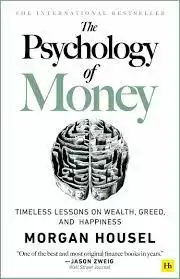الوصف
Do you want to understand the psychology behind why we make money decisions? Are you interested in learning how to have a healthier relationship with money and investing? If you answered yes to either of these questions, then this blog post is for you! We dive into Morgan Housel’s book The Psychology of Money and explore how it can help us become better, smarter investors.
Introduction to The Psychology of Money by Morgan Housel
The book, The Psychology of Money, by Morgan Housel, is a must-read for anyone interested in improving their relationship with money. Morgan Housel covers a range of topics, including how we are irrational and emotional beings when it comes to our finances, how saving and spending habits play a role in our success or failure as investors, and the importance of time and compounding. The book is well-organized and easy to read, making it an excellent resource for anyone looking to improve their financial planning skills.
Overview of the Book
The book, “The Psychology of Money: Timeless Lessons on Wealth, Greed, and Happiness” by Morgan Housel is a collection of tips from a two-time winner of the Best in Business award. The book highlights the importance of saving money and how you can do so effectively. Morgan Housel has the knack of communicating complex concepts in an easy to read and understand way. This book is a must-read for anyone looking to improve their financial situation.
No One’s Crazy: Doing Well With Money Isn’t Necessarily About What You Know
Most of us are bad at saving and investing, but that doesn’t mean we can’t do well with money. In No One’s Crazy: Doing Well With Money Isn’t Necessarily About What You Know, award-winning author Morgan Housel shares 19 short stories that show how behavior is more important than knowledge when it comes to financial success.
Welch’s story shows how much deeper the psychology of money can go. Most of the attention goes to how people invest, but what we forget is that spending is just as important as investing. If you want to be successful with money, you need to understand both sides of the equation.
No One’s Crazy: Doing Well With Money Isn’t Necessarily About What You Know is a book that everyone should read. It will change the way you think about money and help you create a pathway to financial success.
How to Develop a Better Relationship with Money
If you’re looking to develop a better relationship with money, Morgan Housel’s book, The Psychology of Money, is a must-read. In it, the award-winning author explores the strange ways people think about money and teaches you how to overcome the psychological obstacles that keep you from achieving financial success. Every decision people make with money is justified by taking the information they have at the moment and plugging it into their unique mental models. It’s not a book about what to do with your money. It’s a book about what happens in your head when you try to do things with your money.
The Strange Ways People Think About Wealth, Greed, and Happiness
If you’re like most people, you probably think of money in terms of what you have and don’t have. You might think about how much money you need to save for a rainy day, or how much money you can spend on your favorite things. And you might worry about how you’re going to pay your bills each month.
But money isn’t just about having and spending it. It’s also about thinking about money in terms of what it can buy. For example, you might think about how much money you can afford to save each month. Or you might think about how much money you can borrow to buy a car or a house.
And finally, money is about happiness. You might think about how happy you are with the things that you have and the things that you’re planning to buy. Or you might think about how happy you would be if your financial situation were different.
In The Psychology of Money, award-winning author Morgan Housel shares 19 short stories exploring the strange ways people think about money and teaches you how to do well with money no matter what your financial situation is. This book will help you understand why some people are happier than others with their money, and it will show you how to change your thinking so that you’re happier with your money too.
The Psychology of Money Summary
The Psychology of Money by Morgan Housel (2020) examines personal finance through the lens of human behavior.
It’s a fresh take on a well-trod topic that aims to highlight the importance of personal finance and how it affects our overall lives.
The book is divided into seven sections, each addressing a different aspect of money management.
Morgan Housel outlines the psychological principles that drive our thoughts and actions around money, and discusses how these principles can help us achieve financial stability.
The Psychology of Money is an important work that will help readers better understand their own financial behavior and the role money plays in their lives.
The Soft Skills Needed for Financial Success
The psychology of money is a soft skill that is more important than what you know about money. In The Psychology of Money, Morgan Housel shares 19 short stories that explore the strange ways people think about money. Financial success is a soft skill, and the aim of this book is to show you that by treating finances as only a hard science, we handicap ourselves. Financial success is a result of your soft skills (how you manage your psychology and emotional impulses) more than your technical skills on financial matters. So if you’re looking to improve your financial future, be sure to read The Psychology of Money.
The Power of Behavior Change and Financial Decisions
The premise of Morgan Housel’s new book, The Psychology of Money, is that our behavior is inborn and varies by person, is hard to measure, changes over time, and people are prone to deny it. This makes it difficult to achieve financial goals. However, by understanding how our behavior works, we can make smarter financial decisions.
In The Psychology of Money, Morgan Housel provides readers with a comprehensive understanding of how our behavior influences our financial decisions. He covers topics such as the power of habit, the role of emotions in finance, and the traps of overconfidence and optimism. This book is a valuable resource for anyone looking to improve their relationship with money or make smarter financial decisions.
How to Make Smarter Financial Decisions
Morgan Housel’s book, The Psychology of Money, is a must-read for anyone hoping to achieve financial independence. In this book, Morgan Housel shares 19 short stories exploring the strange ways people think about money and teaches you how your behavior (e.g. seeking status, envy, and other emotions controlling you) affects your financial decisions. It’s about how you behave and how behavior is hard to teach even to really smart people. Money―investing, personal finance, and business decisions―is typically dominated by emotions such as seeking status, envy, and other emotions controlling you. The Psychology of Money is a great book for anyone looking to improve their relationship with money and make smarter financial decisions.
Conclusion: Timeless Lessons on Wealth, Greed, and Happiness
In The Psychology of Money: Timeless Lessons on Wealth, Greed, and Happiness, Morgan Housel shares 19 short stories exploring the strange ways people think about money and teaches you how to have a better relationship with money and make smarter financial decisions. By understanding how we’re irrational, emotional beings, Housel’s book is a valuable asset for anyone looking to improve their financial situation.
Money’s greatest intrinsic value—and this can’t be overstated—is its ability to give you control over your time
Spending money to show people how much money you have is the fastest way to have less money.
Use money to gain control over your time, because not having control of your time is such a powerful and universal drag on happiness. The ability to do what you want, when you want, with who you want, for as long as you want to, pays the highest dividend that exists in finance.



